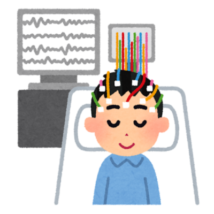
Brain waves are weak electrical signals emitted from brain activity. The electrical signals produced when nerve cells in the brain are active are measured as brain waves. These signals are collected and analyzed from the surface of the scalp using special electrodes. In medicine, EEG (electroencephalography) is used to evaluate brain conditions such as sleep disorders and epilepsy, and to manage stress and concentration.
An electroencephalograph electrode is a special device used to measure brain waves. These electrodes are small sensors attached to the surface of the scalp to receive weak electrical signals from brain activity. Typically, electroencephalograph electrodes are affixed to the scalp to allow real-time monitoring of brain activity. This enables us to understand the state and function of the brain, which can be useful in diagnosing and treating diseases, as well as in research on brain activity.
Silver chloride electrodes are mainly used as electrode elements. These electrodes are preferred because they have a lower polarization voltage compared to other types, making them the best choice for efficiently capturing EEG signals from the body surface.
Related word
Applications
Electrocardiograph electrodes (electrodes for ECG)
Electromyocardiograph electrodes (electrodes for EMG)
Electrodes for blood glucose measurement (electrodes for SMBG, CGM, FMG)

